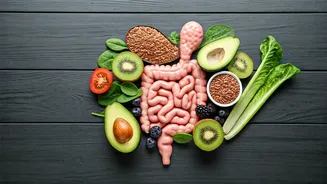Beyond Fiber's Role
Fiber is often presented as the ultimate remedy for constipation, yet other foods play a significant role in gut health and the alleviation of this common
digestive problem. Understanding the complex interplay of these foods can lead to a more effective strategy. Many foods contain compounds that can accelerate the passage of stool through the digestive tract. Certain fats, for example, can have a lubricating effect, making it easier for the digestive system to move food along. Conversely, highly processed foods may lack these beneficial compounds, thus contributing to the issue.
Oily Choices for Relief
Fats, especially those found in certain oils, can serve as a natural lubricant for the digestive system. Olive oil, in particular, is known to stimulate the digestive tract, facilitating easier bowel movements. Additionally, the use of flaxseed oil is also beneficial due to its rich omega-3 fatty acid content. These oils, when incorporated into the diet, can coat the intestinal walls, minimizing friction and smoothing the way for stools. The recommended usage involves adding these oils to salads or lightly drizzling them over cooked vegetables. This easy dietary adjustment can often lead to quick relief and improved digestive comfort.
The Power of Prunes
Prunes are a well-known natural remedy for constipation, and their effectiveness is rooted in their unique composition. They are rich in fiber, which adds bulk to the stool, making it easier to pass. Besides fiber, prunes also contain sorbitol, a sugar alcohol that naturally draws water into the intestines. This combination of effects softens the stool and promotes regularity. Including prunes in one’s diet, whether as a snack or as part of a meal, can be a simple yet effective way to combat constipation. For those experiencing occasional constipation, a handful of prunes can often bring about the desired relief without the need for medication.
Hydration's Crucial Role
Water is essential for overall health, and its role in relieving constipation is particularly vital. When the body doesn't receive adequate hydration, the colon absorbs water from the stool, resulting in harder, more difficult-to-pass stools. Consuming enough water can keep the stools soft and easier to eliminate. This means drinking ample amounts of water throughout the day. In addition to plain water, hydrating beverages such as herbal teas and infused water, can also contribute to maintaining hydration levels and promoting digestive health. For those who struggle to drink plain water, integrating these alternatives can make the process easier and more enjoyable.
Coffee's Stimulating Effects
Coffee is known to stimulate bowel movements in many individuals, though the mechanism behind this effect is not fully understood. The acidity in coffee can encourage the digestive system to contract and move food along. While coffee may not be a long-term solution for constipation, the brief, stimulating effect can provide temporary relief for some people. However, because caffeine can also lead to dehydration if you do not drink enough water, it’s important to drink coffee in moderation, particularly if you’re also experiencing constipation. As with any dietary change, it's wise to pay attention to your body's response and adjust accordingly.
Fermented Foods' Benefits
Fermented foods are beneficial for gut health due to their high probiotic content. Probiotics are beneficial bacteria that can help maintain a healthy balance in the gut microbiome. This balance is important because it helps regulate digestion and bowel function. Yogurt, kefir, and sauerkraut are excellent sources of probiotics. Regularly consuming these foods can increase the diversity of gut bacteria, potentially easing constipation symptoms. Introduce these foods gradually to avoid any digestive discomfort and to allow your gut to adapt. They are easy to integrate into your daily meals, and may improve overall digestive wellness.
Other Helpful Choices
Beyond those listed, other foods may also assist in relieving constipation. Kiwifruit, for instance, has shown to improve bowel function in some people. Citrus fruits like oranges and grapefruits contain natural compounds that can help stimulate digestion. Consuming these foods in moderation, along with a well-rounded diet, can contribute to more regular bowel movements. By including these options in your dietary plan, you can diversify your nutrient intake and further support digestive health. It’s essential to consider individual tolerances as some people may experience different responses to these food groups.
Making Dietary Changes
Implementing dietary changes is a gradual process. Start by adding one or two of the foods mentioned, and monitor your body's response. If you experience positive results, gradually introduce other beneficial foods into your routine. It's important to pair dietary changes with other lifestyle adjustments, such as increased physical activity and adequate hydration. By taking a holistic approach, you can improve your overall digestive wellness and decrease the chance of constipation. Remember, consistency is key, and the best results come from making these changes a sustainable part of your lifestyle.













